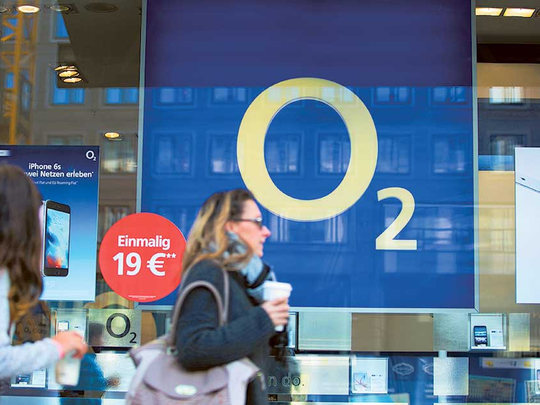
Madrid: Telefonica SA shelved plans to sell a stake in its wireless carrier O2, as Britain’s decision to leave the European Union roiled markets and created a final, insurmountable hurdle to a 15-month sales effort aimed at cutting debt.
Telefonica was weighing options for the UK unit including an initial public offering after the EU blocked its £10.25 billion (Dh50.7 billion, $13.8 billion) sale last month, people familiar with the matter have said. Instead it will consolidate O2 back into its financial statements, and no longer present the unit as discontinued operations, according to a regulatory filing Wednesday.
The Spanish carrier “continues to explore different strategic alternatives for O2 UK, to be implemented when market conditions are right,” it said.
The retreat marks one of the biggest examples so far of the damage Brexit is causing businesses inside and outside the UK. Telefonica was counting on O2’s sale to CK Hutchison Holdings Ltd. to pay down some of its 50.2 billion euros ($55.7 billion) in debt. With that deal blocked, Brexit has made the backup plan — a minority sale in an IPO or negotiated deal — impossible. With the pound and stock markets falling, Telefonica now risks a credit downgrade by Moody’s Corp if it can’t get an alternate deleveraging plan in place by year-end.
Infrastructure unit
On June 24 — the day after the UK vote — officials at Spain’s biggest phone company met with financial advisers to discuss options for O2 and whether to delay its planned IPO of a stake in infrastructure unit Telxius, according to people familiar with the situation. The Telxius stock sale, which was to have been announced this week, would have raised as much as €1.5 billion, the people have said.
Moody’s on May 12 placed Telefonica’s rating outlook on negative watch, while it maintained a Baa2 rating, two grades above junk level, for the carrier.
To raise cash, Telefonica could also reduce its dividend, which is set at €0.75 a share for the year, or about €3.7 billion in total, based on about 4.98 billion existing shares. The company has hinged the cash payout to shareholders to the sale of O2. It can also issue hybrid-bonds, which don’t count as debt, according to Moody’s.
Telefonica is also seeking to sell Argentine TV broadcaster Telefe, according to people familiar with the matter, as it weighs tapping non-core assets to raise funds. The carrier also has small equity investments in several companies, including Banco Bilbao Vizcaya Argentaria SA and China Unicom Hong Kong Ltd.
Post-Brexit performance
Since the referendum, Telefonica has declined about 10 per cent, the second-worst performance among the 22 members of the Stoxx 600 Telecommunications Index, trailing only Telecom Italia SpA. Telefonica rose about 6.3 per cent to 8.33 euros at 4pm in Madrid on Wednesday, giving the company a market value of about €41.5 billion.
Spreads on the company’s 1.46 per cent bonds maturing in 2026 have widened along with other European companies, to about 145 basis points above comparable government benchmarks, from about 132 basis points before the vote.
Telefonica isn’t the only European carrier to weighing the impact of Brexit after last week’s vote: Vodafone Group Plc said Tuesday it’ll consider moving its headquarters elsewhere unless the UK negotiates continued access to the EU’s single market and workers.












